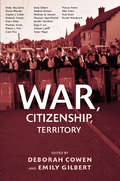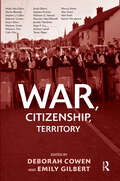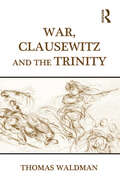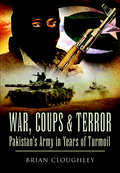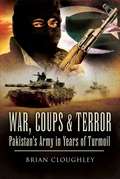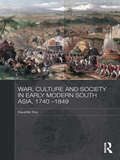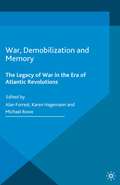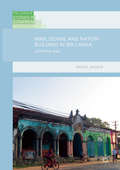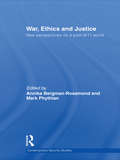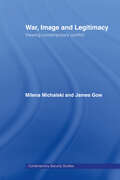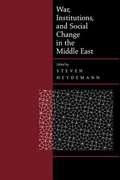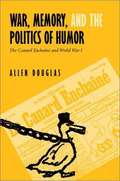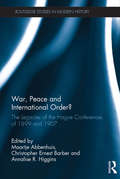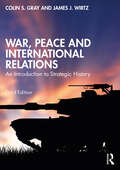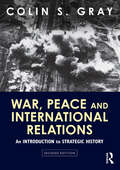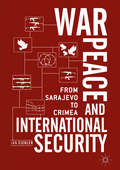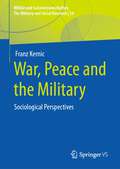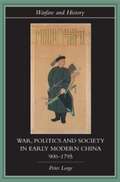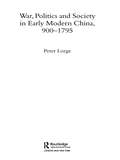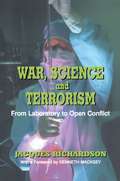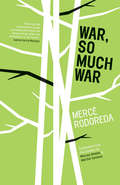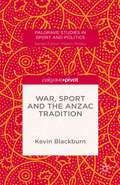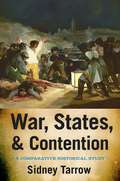- Table View
- List View
War, Citizenship, Territory
by Deborah Cowen Emily GilbertFor all too obvious reasons, war, empire, and military conflict have become extremely hot topics in the academy. Given the changing nature of war, one of the more promising areas of scholarly investigation has been the development of new theories of war and war’s impact on society. War, Citizenship, Territory features 19 chapters that look at the impact of war and militarism on citizenship, whether traditional territorially-bound national citizenship or "transnational" citizenship. Cowen and Gilbert argue that while there has been an explosion of work on citizenship and territory, Western academia’s avoidance of the immediate effects of war (among other things) has led them to ignore war, which they contend is both pervasive and well nigh permanent. This volume sets forth a new, geopolitically based theory of war’s transformative role on contemporary forms of citizenship and territoriality, and includes empirical chapters that offer global coverage.
War, Citizenship, Territory
by Deborah Cowen Emily GilbertFor all too obvious reasons, war, empire, and military conflict have become extremely hot topics in the academy. Given the changing nature of war, one of the more promising areas of scholarly investigation has been the development of new theories of war and war’s impact on society. War, Citizenship, Territory features 19 chapters that look at the impact of war and militarism on citizenship, whether traditional territorially-bound national citizenship or "transnational" citizenship. The editors argue that while there has been an explosion of work on citizenship and territory, Western academia’s avoidance of the immediate effects of war (among other things) has led them to ignore war, which they contend is both pervasive and well nigh permanent. This volume sets forth a new, geopolitically based theory of war’s transformative role on contemporary forms of citizenship and territoriality, and includes empirical chapters that offer global coverage.
War, Clausewitz and the Trinity
by Thomas WaldmanToday, the ideas of Carl von Clausewitz (1780-1831) are employed almost ubiquitously in strategic studies, military history and defence literatures, but often in a manner which distorts their true meaning. In this book, Waldman explores Clausewitz’s central theoretical device for understanding war - the ’remarkable trinity’ of politics, chance and passion. By situating the great Prussian in historical context, he presents a conception truer to Clausewitz’s intention. Seeking to achieve this through an in-depth reinterpretation of On War and Clausewitz’s other writings, conducted through the prism of the trinity, this book draws on existing studies but argues that there is room for clarification. It presents fresh perspectives into aspects of Clausewitz's thought and emphasises elements of his theory that have often been neglected. Furthermore, it provides a solid basis from which debate on the nature of modern war can move forward.
War, Coups & Terror: Pakistan's Army in Years of Turmoil
by Brian CloughleyIn recent years Pakistan has changed from being a state of regional strategic significance to one of major global importance. Its geographical position and delicate religious and tribal mix, coupled with a complex political structure, have ensured that its actions - and inactions - have attracted close scrutiny since 9/11 and the declaration of the 'War on Terror'.Yet there remains widespread disagreement among political and military analysts as to the real position of this enigmatic nation. What is not in dispute is the importance of the Pakistani Army whose backing was crucial to President Musharraf's rule, as it was to his military predecessors. With restoration of civilian governance in 2008 the army remains no less important in the affairs of the nation.The author has been closely acquainted with the Pakistani military for some thirty years. is links with its past and present senior officers have given him a unique insight into its operations and its controversial role within government. While making the Army's position clear, Cloughley is at pains to be objective. For example he is critical of Musharraf's 1999 invasion of the Kargil Sector of the Line of Control. This and similar instances of objectivity and even-handedness, which may not be welcomed in all quarters, gives this work its credibility.Operations against the 2003–2004 tribal uprising are described for the first time and benefit from access to the Corps Commander's diary of the period and from further detailed information in 2006–2008.With its coverage of military-political relations since Zulfiqar Ali Bhutto came to power in 1971, this book, the first major study of the Pakistan Army for many years, will be welcomed by all those seeking a closer understanding of this enigmatic and complex country, its ambitions, affiliations and loyalties. While its content and conclusions will inevitably be contentious there is no disputing the topicality and importance of War, Coups and Terror.
War, Coups and Terror: Pakistan's Army in Years of Turmoil
by Brian CloughleyIn recent years, Pakistan has changed from being a state of regional strategic significance to one of major global importance. Its geographical position and delicate religious mix, coupled with a complex political structure and its status as a nuclear power, have ensured that its actions-and inactions-have attracted close scrutiny since 9/11 and the declaration of the 'War on Terror.' Yet there remains widespread dis-agreement among political and military analysts as to the real position of this enigmatic nation. In War, Coups, and Terror, Brian Cloughley explores the underbelly of Pakistan's military and its controversial role within the Pakistani government since Zulfiqar Ali Bhutto came to power in 1971. An insider with links to Pakistan's past and present senior officers, Cloughley provides a unique insight into the Army's influence and position as a force in the fight against al-Qaeda and the Taliban, as well as an account of operations against the 2003-2004 tribal uprising. His coverage of military-political relations will fascinate those who seek a closer understanding of this enigmatic and complex country, its ambitions, affiliations, and loyalties.
War, Culture and Society in Early Modern South Asia, 1740-1849 (Asian States and Empires)
by Kaushik RoyThis book argues that the role of the British East India Company in transforming warfare in South Asia has been overestimated. Although it agrees with conventional wisdom that, before the British, the nature of Indian society made it difficult for central authorities to establish themselves fully and develop a monopoly over armed force, the book argues that changes to warfare in South Asia were more gradual, and the result of more complicated socio-economic forces than has been hitherto acknowledged. The book covers the period from 1740, when the British first became a major power broker in south India, to 1849, when the British eliminated the last substantial indigenous kingdom in the sub-continent. Placing South Asian military history in a global, comparative context, it examines military innovations; armies and how they conducted themselves; navies and naval warfare; major Indian military powers - such as the Mysore and Khalsa kingdoms, the Maratha confederacy - and the British, explaining why they succeeded.
War, Demobilization and Memory: The Legacy of War in the Era of Atlantic Revolutions (War, Culture and Society, 1750-1850)
by Alan Forrest Karen Hagemann Michael RoweThis volume examines the impact of the wars in the Atlantic world between 1770 and 1830, focusing both on the military, economic, political, social and cultural demobilization that occurred immediately at their end, and their long-term legacy and memory.
War, Denial and Nation-Building in Sri Lanka
by Rachel SeoigheThis book begins from a critical account of the final months of the Sri Lankan civil war, tracing themes of nationalism, discourse and conflict memory through this period of immense violence and into its aftermath. Using these themes to explore state crime, atrocity and its denial and representation, Seoighe offers an analysis of how stories of conflict are authored and constructed. This book examines the political discourse of the former Rajapaksa government, highlighting how fluency in international discourses of counter-terrorism, humanitarianism and the 'reconciliation' expected of states transitioning from conflict can be used to conceal and deny state violence. Drawing on extensive interviews with activists, academics, politicians, state representatives and international agency staff, and three months of observation in Sri Lanka in 2012, Seoighe demonstrates how the Rajapaksa government re-narrativised violence through orchestrated techniques of denial and mass ritual discourse. It drew on and perpetuated a heightened majoritarian Sinhala-Buddhist nationalism which consolidated power under Sinhalese political elites, generated minority grievances and, in turn, sustained the repression and dispossession of the Tamil community of the Northeast. A detailed and evocative study, this book will be of special interest to scholars of conflict studies, political violence and critical criminology.
War, Ethics and Justice: New Perspectives on a Post-9/11 World (Contemporary Security Studies)
by Mark Phythian Annika Bergman-RosamondThis edited volume addresses the key issues of ethics, war and international relations in the post-9/11 world. There is a lively debate in contemporary international relations concerning the relationship between statist obligations to one’s own political community and cosmopolitan duties to distant others. This volume contributes to this debate by investigating aspects of the ethics of national military and security and intelligence policies in the post-9/11 environment. The discursive transformation of national militaries into ‘forces for good’ became normalized as the Cold War subsided. While the number of humanitarian military interventions and operations rose considerably in the immediate post-Cold War period, the advent of the ‘war on terror’ raised questions about exactly what we mean by ethical behaviour in terms of military and security policies. This volume interrogates this key question via a focus that is both distinctive and illuminating – on national military ethics; femininities, masculinities and difference; and intelligence ethics. The key objectives are to demonstrate the important linkages between areas of international relations that are all too often treated in isolation from one another, and to investigate the growing tension between cosmopolitan and communitarian conceptions of intelligence and security and the use of armed force. This book will be of much interest to students of security studies, ethics, gender studies, intelligence studies, and international relations in general. Mark Phythian is Professor of Politics in the Department of Politics and International Relations at the University of Leicester. He is the author or editor/co-editor of ten books. Annika Bergman-Rosamond is Senior Researcher at the Danish Institute for International Studies in Copenhagen.
War, Image and Legitimacy: Viewing Contemporary Conflict (Contemporary Security Studies #Vol. 47)
by James Gow Milena MichalskiThis book examines how image affects war and whether image affects our understanding of war. Crucially, how can moving-image representation of conflict affect the legitimacy, conduct and outcome of contemporary warfare? The collapsing Twin Towers of September 11; the hooded figure at the Abu Ghraib prison in Iraq; the images of beheadings on the internet; the emaciated figure in a Bosnian-Serb concentration camp; the dancing flashes across the skylines of Baghdad as US-led air bombardment deals blows to another ‘rogue’ regime: such images define contemporary conflict. Drawing on a wide range of examples from fiction and factual film, current affairs and television news, as well as new digital media, this book introduces the notion of moving images as the key weapons in contemporary armed conflict. The authors make use of information about the US, the UK, the ‘War on Terror’, the former Yugoslavia, former Soviet states, the Middle East and Africa. War, Image and Legitimacy will be of great interest to students of war and security studies, media and communication studies, and international relations in general.
War, Institutions and Social Change in the Middle East
by Steven HeydemannA fresh look at the effects of war on state and society in the Middle East, challenging traditional assumptions based on European experience. The authors argue that war has destabilized Middle Eastern states and eroded national cohesion.
War, Memory and the Politics of Humor: The Canard Enchaîné and World War I
by Allen DouglasA cultural history of Le Canard Enchaîné, the famous French satirical newspaper, from its founding during World War I through the 1920s.
War, Peace and International Order?: The Legacies of the Hague Conferences of 1899 and 1907 (Routledge Studies in Modern History)
by Maartje Abbenhuis Christopher Ernest Barber Annalise R. HigginsThe exact legacies of the two Hague Peace Conferences remain unclear. On the one hand, diplomatic and military historians, who cast their gaze to 1914, traditionally dismiss the events of 1899 and 1907 as insignificant footnotes on the path to the First World War. On the other, experts in international law posit that The Hague’s foremost legacy lies in the manner in which the conferences progressed the law of war and the concept and application of international justice. This volume brings together some of the latest scholarship on the legacies of the Hague Peace Conferences in a comprehensive volume, drawing together an international team of contributors.
War, Peace and International Order?: The Legacies of the Hague Conferences of 1899 and 1907 (Routledge Studies in Modern History)
by Maartje Abbenhuis Christopher Ernest Barber Annalise R. HigginsThe exact legacies of the two Hague Peace Conferences remain unclear. On the one hand, diplomatic and military historians, who cast their gaze to 1914, traditionally dismiss the events of 1899 and 1907 as insignificant footnotes on the path to the First World War. On the other, experts in international law posit that The Hague’s foremost legacy lies in the manner in which the conferences progressed the law of war and the concept and application of international justice.This volume brings together some of the latest scholarship on the legacies of the Hague Peace Conferences in a comprehensive volume, drawing together an international team of contributors.
War, Peace and International Relations: An Introduction to Strategic History
by James J. Wirtz Colin S. GrayThis textbook provides a comprehensive introduction to the strategic history of the past two centuries, showing how those 200 years were shaped and reshaped extensively by war. The book takes a broad view of what was relevant to the causes, courses and consequences of conflict. The volume provides students with a strong grounding in the contribution of war to the development of the modern world, from the pre-industrial era to the age of international terrorism and smart weapons. Covering all the major wars of the past two centuries, the third edition has been revised and updated and now includes: new introductory essays at the start of each section to help students recognize historical turning points and strategic themes; revised and updated material on the post-Cold War period, accommodating new developments and contemporary perspectives; new material on non-Western views on strategy, especially Sun Tzu; a new chapter on ‘The age of acceleration and great power competition’, starting with the death of Bin Laden and ending with the Ukraine crisis; a new Conclusion offering a synthesis between the message of earlier editions and the state of strategy today. This textbook will be essential reading for students of strategic studies, security studies, war studies, International Relations and international history.
War, Peace and International Relations: An introduction to strategic history
by Colin S. GrayWar, Peace and International Relations provides an introduction to the strategic history of the past two centuries, showing how those 200 years were shaped and reshaped extensively by war. The book takes a broad view of what was relevant to the causes, courses, and consequences of wars. Written by leading strategist Professor Colin Gray, the book provides students with a good grounding in the contribution of war to the development of the modern world, from the pre-industrial era to the age of international terrorism and smart weapons. This second edition has been thoroughly revised and updated: It is the first one-volume strategic history textbook on the market; It covers all the major wars of the past two centuries; It is up to date and comprehensive, including a new section on the American Civil War, a new chapter on geography and strategy, and completely rewritten chapters on Iraq and Afghanistan in the 2000s and on irregular warfare. This textbook will be essential reading for students of strategic studies, security studies, war studies, international relations and international history.
War, Peace and International Security
by Jan EichlerThis book examines and explains the dialectic of war and peace between the outbreak of WWI and the Russian annexation of Crimea in 2014. The theoretical inspiration is built upon Galtung's concept of negative and positive peace, Aron#65533;s distinction between strategy and diplomacy, and Carr#65533;s theory of periodization. Here, the author compares globalization with the interwar period and examines how the first decade#65533;s positive peace, diplomacy, and big hopes were replaced by negative peace, and explains the growing role of military strategy which culminated after the Russian annexation of Crimea and the following military incidents between NATO and Russia. This volume will be of interest to teachers, students, and researchers in the fields of modern history, international security and peace studies.
War, Peace and the Military: Sociological Perspectives (Militär und Sozialwissenschaften/The Military and Social Research #56)
by Franz KernicThis book is a comprehensive analysis of the various social science approaches to explaining and interpreting war, peace and the military. Its central aim is to trace and reconstruct those basic assumptions constructed and 'thought processes' undertaken by modern social sciences in their research and conceptualization of military violence and the use of force. In addition to such reconstruction, the aim is also to enquire into the preconditions of such thought. This study therefore eschews the development of an explicit 'strategy' (in the sense of a research strategy), but instead is much more concerned with thinking about its subject matter by means of re-thinking and reflecting upon different theoretical approaches and problems. The investigation includes a critical reexamination of the tradition of military-sociological research from the beginning of modern sociology to late-twentieth century theoretical approaches regarding the security-focused and/or war-driven aspects of modern society.
War, Politics And Society In Early Modern China 900-1795
by Peter LorgeThis comprehensive survey of Chinese military history is the only book in English to span the significant years from 900 - 1795. Peter Lorge questions current theories on China's relationship to war, and argues that war was the most important tool used by the Chinese in building and maintaining their empire. Emphasizing the relationship between the military and politics, chapters are organised around specific military events and, Lorge argues, the strength of territorial claims and political impact of each dynasty were determined by their military capacity. Ideal as a course adoption text for Asian military studies, this is also valuable for students of Chinese studies, military studies and Chinese history.
War, Politics and Society in Early Modern China, 900-1795 (Warfare and History)
by Peter LorgeThis comprehensive survey of Chinese military history is the only book in English to span the significant years from 900 – 1795. Peter Lorge questions current theories on China’s relationship to war, and argues that war was the most important tool used by the Chinese in building and maintaining their empire. Emphasizing the relationship between the military and politics, chapters are organised around specific military events and, Lorge argues, the strength of territorial claims and political impact of each dynasty were determined by their military capacity. Ideal as a course adoption text for Asian military studies, this is also valuable for students of Chinese studies, military studies and Chinese history.
War, Religion and Empire
by Andrew PhillipsWhat are international orders, how are they destroyed, and how can they be defended in the face of violent challenges? Advancing an innovative realist-constructivist account of international order, Andrew Phillips addresses each of these questions in War, Religion and Empire. Phillips argues that international orders rely equally on shared visions of the good and accepted practices of organized violence to cultivate cooperation and manage conflict between political communities. Considering medieval Christendom's collapse and the East Asian Sinosphere's destruction as primary cases, he further argues that international orders are destroyed as a result of legitimation crises punctuated by the disintegration of prevailing social imaginaries, the break-up of empires, and the rise of disruptive military innovations. He concludes by considering contemporary threats to world order, and the responses that must be taken in the coming decades if a broadly liberal international order is to survive.
War, Science and Terrorism: From Laboratory to Open Conflict
by Dr J RichardsonDescribes the application of research to the evolution of weapons. It shows how natural, engineering, information and environmental sciences are exploited how even social science is applied to recruitment, battlefield and logistical management, and careful preparation of terroristic acts.
War, So Much War
by Martha Tennent Mercè Rodoreda Maruxa RelañoWe first meet its young protagonist, Adrià Guinart, as he is leaving Barcelona out of boredom and a thirst for freedom, embarking on a long journey through the backwaters of a rural land that one can only suppose is Catalonia, accompanied by the interminable, distant rumblings of an indefinable war. <P><P> In vignette-like chapters and with a narrative style imbued with the fantastic, Guinart meets with numerous adventures and peculiar characters who offer him a composite, if surrealistic, view of an impoverished, war-ravaged society and shape his perception of his place in the world.As in Rodoreda's Death in Spring, nature and death play an fundamental role in a narrative that often takes on a phantasmagoric quality and seems to be a meditation on the consequences of moral degradation and the inescapable presence of evil.Mercè Rodoreda (1908-1983) is widely regarded as the most important Catalan writer of the twentieth century. Exiled in France and Switzerland following the Spanish Civil War, Rodoreda began writing the novels and short stories--Twenty-Two Short Stories, The Time of the Doves, Camellia Street, Garden by the Sea--that would eventually make her internationally famous.
War, Sport and the Anzac Tradition (Palgrave Studies in Sport and Politics)
by Kevin BlackburnCommemoration of war is done through sport on Anzac Day to remember Australia's war dead. War, Sport and the Anzac Tradition traces the creation of this sporting tradition at Gallipoli in 1915, and how it has evolved from late Victorian and Edwardian ideas of masculinity extolling prowess on the sports field as fostering prowess on the battlefield.
War, States, and Contention: A Comparative Historical Study
by Sidney TarrowFor the last two decades, Sidney Tarrow has explored "contentious politics"--disruptions of the settled political order caused by social movements. These disruptions range from strikes and street protests to riots and civil disobedience to revolution. In War, States, and Contention, Tarrow shows how such movements sometimes trigger, animate, and guide the course of war and how they sometimes rise during war and in war's wake to change regimes or even overthrow states. Tarrow draws on evidence from historical and contemporary cases, including revolutionary France, the United States from the Civil War to the anti-Vietnam War movement, Italy after World War I, and the United States during the decade following 9/11. In the twenty-first century, movements are becoming transnational, and globalization and internationalization are moving war beyond conflict between states. The radically new phenomenon is not that movements make war against states but that states make war against movements. Tarrow finds this an especially troublesome development in recent U.S. history. He argues that that the United States is in danger of abandoning the devotion to rights it had expanded through two centuries of struggle and that Americans are now institutionalizing as a "new normal" the abuse of rights in the name of national security. He expands this hypothesis to the global level through what he calls "the international state of emergency."
